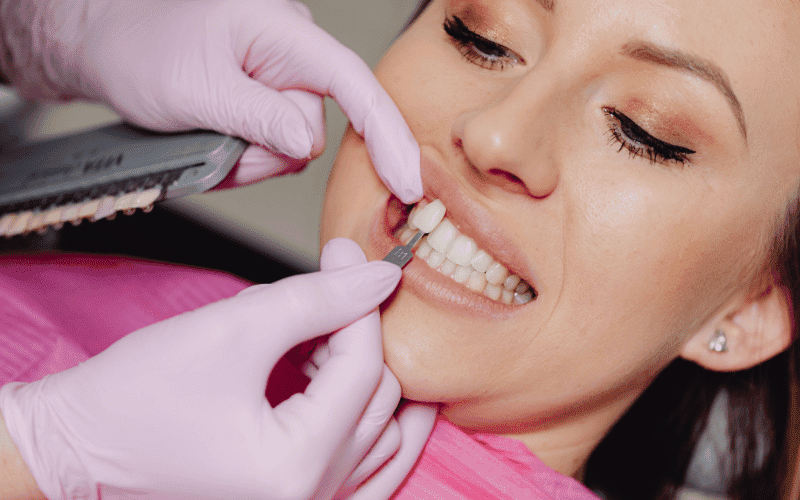ONLINE SCHEDULING AND VIRTUAL CONSULTS AVAILABLE

What to Do if You Have Intense Pain After Dental Veneers?

Experiencing intense pain after getting dental veneers can be unsettling. You’ve just invested in a beautiful smile, and now discomfort is throwing a wrench into your plans. It’s crucial to understand why this pain might be happening and what you can do to alleviate it.
In this blog, we’ll explore the common causes of pain after dental veneers and offer immediate steps to take for relief. We’ll guide you on when to reach out to your dentist and what treatments might be available. Plus, we’ll share tips on how to prevent future discomfort, so you can enjoy your new smile without worries.
Let’s dive in and get you back to feeling great about your veneers!
Common Causes of Pain After Dental Veneers
Understanding why you might feel intense pain after getting dental veneers is the first step toward relief. Here are some common causes:
1. Tooth Sensitivity: When veneers are placed, your teeth might react to hot, cold, or sweet foods due to increased sensitivity. This can be a temporary adjustment period.
2. Misalignment: If the veneers are not properly aligned with your bite, it can cause discomfort. Misaligned veneers can affect how your teeth meet and lead to pain.
3. Veneer Thickness: Sometimes, the thickness of the veneers might contribute to discomfort. If they are too thick or not well-fitted, they can create pressure on the underlying teeth.
4. Gum Irritation: The placement of veneers can occasionally irritate the gums, leading to soreness or swelling.
If you’re experiencing pain after getting veneer Plantation, it’s essential to identify the cause to find the best solution.
Immediate Steps to Take
If you’re dealing with intense pain after dental veneers, here’s what you can do right away to manage it:
1. Rinse with Warm Salt Water: Gently rinse your mouth with warm salt water to soothe any irritation and reduce inflammation. This simple remedy can offer temporary relief.
2. Use Over-the-Counter Pain Relief: Non-prescription pain relievers like ibuprofen or acetaminophen can help alleviate pain. Follow the dosage instructions and consult your dentist if you have any concerns.
3. Avoid Hard or Sticky Foods: Stick to soft foods that are less likely to aggravate your discomfort. Avoiding hard or sticky substances can prevent additional pressure on your veneers.
4. Practice Good Oral Hygiene: Continue brushing and flossing regularly, but be gentle around the areas where you feel pain to avoid further irritation.
Taking these steps can help manage pain until you can see your dentist for a thorough evaluation.
When to Contact Your Dentist?
Knowing when to reach out to your dentist is crucial for addressing intense pain after getting veneers. Consider contacting your dentist if:
1. Pain Persists or Worsens: If the pain doesn’t subside with at-home remedies or seems to get worse, it’s time to seek professional help.
2. You Experience Severe Discomfort: If the pain is severe and impacts your daily activities, your dentist should evaluate the situation.
3. You Notice Damage: If you see any damage to the veneers or notice changes in your bite, professional assessment is necessary.
4. You Have Signs of Infection: Symptoms like swelling, redness, or discharge around the veneers could indicate an infection, which needs immediate attention.
Your dentist will provide a comprehensive evaluation to determine the cause of the pain and recommend appropriate treatment.
Possible Treatments and Solutions
If your pain is due to issues with your dental veneers, various treatments and solutions may be available:
1. Adjustments: Your dentist may need to adjust the veneers to ensure they align correctly with your bite and reduce any pressure points.
2. Replacement or Repair: In some cases, if the veneers are damaged or poorly fitted, replacing or repairing them might be necessary.
3. Desensitizing Treatments: Special treatments or gels can help reduce tooth sensitivity caused by veneers.
4. Gum Care: If gum irritation is the issue, your dentist might recommend specific products or treatments to soothe the gums.
Exploring these options with your dentist can help address the cause of your pain and get you back to enjoying your veneers.
Preventive Measures for Future Discomfort
Preventing future discomfort after getting veneers involves taking proactive steps to care for your smile:
1. Regular Dental Check-Ups: Schedule routine visits with your dentist to ensure your veneers remain in good condition and address any potential issues early.
2. Proper Oral Hygiene: Maintain a diligent oral hygiene routine, including brushing, flossing, and using mouthwash, to keep your veneers and surrounding teeth healthy.
3. Avoid Hard Foods: Refrain from chewing hard or sticky foods that could damage your veneers or cause discomfort.
4. Use a Mouthguard: If you grind your teeth, a mouthguard can protect your veneers from excessive wear and tear.
By following these preventive measures, you can minimize the risk of discomfort and enjoy your veneers for years to come.
Frequently Asked Questions (FAQs)
1. What should I do if my veneers feel too tight?
If your veneers feel too tight, contact your dentist. They may need to adjust the fit to ensure comfort.
2. Is it normal to experience some pain after getting veneers?
Mild discomfort is common as your mouth adjusts, but intense or persistent pain should be evaluated by your dentist.
3. How long does it take for veneers to stop feeling sensitive?
Sensitivity typically decreases within a few weeks, but if it persists, consult your dentist.
4. Can over-the-counter pain medications help with veneer pain?
Yes, over-the-counter pain medications can provide temporary relief. Follow dosage instructions and consult your dentist if needed.
5. When should I seek immediate dental care for veneer pain?
Seek immediate care if you experience severe pain, signs of infection, or noticeable damage to the veneers.
Intense pain after getting dental veneers can be frustrating, but understanding the causes and knowing how to manage them can make a big difference. By following the recommended steps, seeking timely dental care, and implementing preventive measures, you can address discomfort effectively and enjoy your new smile with confidence. If pain persists, consult your dentist to ensure your veneers are in optimal condition and your smile remains healthy.





